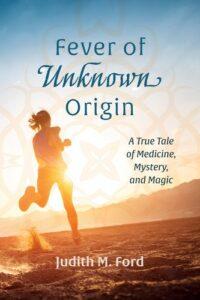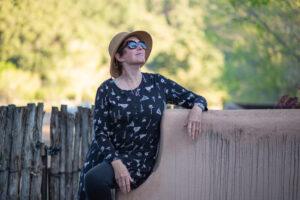Never Give Up
September 20, 2022
Note From Rochelle
Dear Writers,
I am so excited. For a long time, I have wanted to team up with my dear friend and colleague Liesel Teversham—and we’re finally doing it! Liesel is an amazing coach who offers support to her clients through both EFT (Emotional Freedom Techniques or tapping), and CliftonStrengths. I’ve taken several of her classes and group programs, and they have changed my life for the better. (Seriously!) Liesel is joining me in October for a two-session workshop on Overcoming Procrastination and Fear to Write. Take a look at the class on my workshop page, and sign up soon. This will be amazing!
Today, I am delighted to welcome Judith Ford to the blog to talk about her new book, Fever of Unknown Origin. I’ll be interviewing Judith for her book event at Boswell Book Company on Friday.
Happy writing,
Rochelle, the Write Now! Coach
Never Give Up: An Interview with Judith Ford
Can you tell us about your new book?
 My new book is called Fever of Unknown Origin. I started writing it two years after I’d spent most of the summer of 1990 in and out of the hospital with a rare disease. I wrote it in bits and pieces over years. And while I was writing it my mother had a massive stroke and my father developed end-stage COPD. I’d hoped to finish the book and also wanted to enroll in an MFA program around the time of my mother’s stroke but postponed both the book and the MFA because I was sure both my parents were going to need my help. They did. And their journey through their last years became the second half of my book.
My new book is called Fever of Unknown Origin. I started writing it two years after I’d spent most of the summer of 1990 in and out of the hospital with a rare disease. I wrote it in bits and pieces over years. And while I was writing it my mother had a massive stroke and my father developed end-stage COPD. I’d hoped to finish the book and also wanted to enroll in an MFA program around the time of my mother’s stroke but postponed both the book and the MFA because I was sure both my parents were going to need my help. They did. And their journey through their last years became the second half of my book.
You went back to school for an MFA at the age of 68. Can you talk a bit about what that experience was like for you—and how the MFA helped you write this book?
The MFA. It was a dream I’d held for decades. I was a psychotherapist for over 35 years but the whole time I also had a big hunger for other arts: music, theatre, dance, and, most of all, writing. One day, at the hairdresser, I ran into a therapist colleague who told me she was attending a low-residency writing program in Vermont, Vermont College of Fine Arts, and she was loving it. This was the first time I’d heard of a low-residency program where you attend on campus for 10 days every semester and the rest of the time you work at home, via email and phone, under the guidance of an advisor who is an accomplished writer. It took a few years before I could find the time to pursue this. By the time I applied, my parents had died, my kids were grown and gone, and I’d retired from my therapy career.
School had always been easy for me; I’d kind of slid my way through my undergrad degree and my MSW degree. But this, Vermont College, captivated me and made me want to work my tail off! I had the freedom, with the guidance of my advisors , to follow my own path. I read books I wanted to read; I wrote short and long fiction and speculative (aka: weird) fiction. And much to my surprise I loved writing literary criticism. The day I graduated from Vermont College of Fine Arts, it was -20 degrees in Montpelier, and I hardly noticed. I was so happy to have accomplished this degree that I cried when I accepted my diploma. One thing VCFA taught me that helped with the book, Fever of Unknown Origin, was how to commit, to put in the hours and days and nights, to get the work done. It also proved to me that I was truly a writer.
You’ve been writing for a long time—and when you started, you were juggling work and family. What are the writing habits you have developed that help you write regularly?
Working habits: I don’t currently have any really set habits. When I was a working mom (also a daily runner, yoga practitioner, dance student, choral singer, and writer), I found the time when I could. Like, after my kids were settled in bed, or during a lunch hour at work, or during an hour when a client had cancelled, or late at night after bedtime stories and goodnight kisses. And occasionally I rented a cabin on Lake Michigan, alone with my dog for a week at a time and wrote for hours. No TV, no phone, no internet. It was glorious. Once I flew to Colorado, rented a cabin near Ouray, CO, and wrote for a solid month with no company except my parrot, Billy. One of my teachers told me, when I was near retirement from psychotherapy, to think twice before “quitting my day job.” Because, she said, you will have more time but will be less disciplined. She was right. I wrote much more when I was too busy to write. These days, I schedule 1.5 to 3 hours a day to write, five days a week, and I don’t always succeed. But I try. I leave my house, go to my writing studio which is about a mile from my home. Being alone in that writing space helps me settle into writing.
Your book is about hope. What advice do you have for writers who struggle with the challenge of getting their work published?
I never imagined my book would get published. I lost myself in the writing of it and didn’t think about publication except occasionally imagining Meryl Streep playing me in a film version of my story. But, seriously, I wrote the story because I needed to write it. During the years I worked on it, I also published about 50 short pieces in various literary magazines. Once the book was done, I planned to self-publish. But before I had a chance to do that a friend persuaded me to try publishing for real. She hooked me up with a friend of hers who used to be an agent but was retired. He guided me through the pitch process which is what you have to do to get a book published. I thank everyone who helped me on this path: my writing coaches, my teachers in Vermont, my friend who pushed me to try publishing, my very supportive husband. Big huge gratitude.
What are you reading now?
What am I reading: Amy Bloom’s book, In Love. (fabulous!); Ram Dass, Still Here; rereading Stephen King’s book, On Writing; and the wonderful Ruth Ozeki,The Book of Form and Emptiness
 About the author. Judith Ford worked as a psychotherapist in private practice for 37 years before retiring and moving with her husband and two dogs to Santa Fe, New Mexico. Her fiction, essays, and poetry have appeared in literary journals, including Quarter After Eight, Southern Humanities, Lullwater Review, Evening Street Review and many others. She has been nominated for Pushcart Prizes, in nonfiction, in fiction and in poetry. In 2005 she won the Willow Review Prose Award and in 2008 her series of haiku poems won “most highly commended” in the Margaret Reid Poetry Contest. She has taught creative writing to sixth graders in a private school, adults at the University of Wisconsin Extension, and teenagers staying in a runaway shelter. She earned an MFA in writing at Vermont College of Fine Arts in 2016. She currently enjoys hikes in the Santa Fe foothills, learning to play the piano and training her singing voice.
About the author. Judith Ford worked as a psychotherapist in private practice for 37 years before retiring and moving with her husband and two dogs to Santa Fe, New Mexico. Her fiction, essays, and poetry have appeared in literary journals, including Quarter After Eight, Southern Humanities, Lullwater Review, Evening Street Review and many others. She has been nominated for Pushcart Prizes, in nonfiction, in fiction and in poetry. In 2005 she won the Willow Review Prose Award and in 2008 her series of haiku poems won “most highly commended” in the Margaret Reid Poetry Contest. She has taught creative writing to sixth graders in a private school, adults at the University of Wisconsin Extension, and teenagers staying in a runaway shelter. She earned an MFA in writing at Vermont College of Fine Arts in 2016. She currently enjoys hikes in the Santa Fe foothills, learning to play the piano and training her singing voice.









